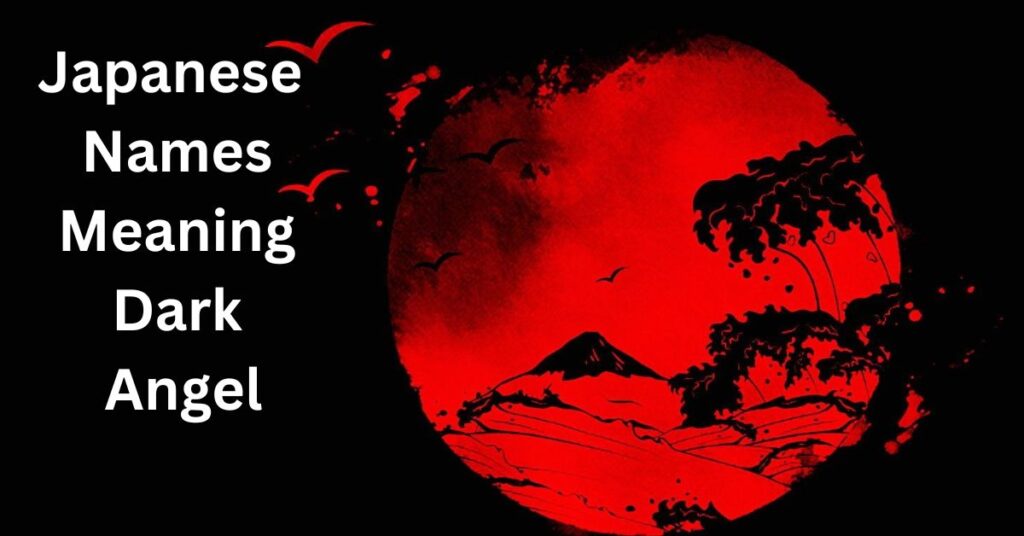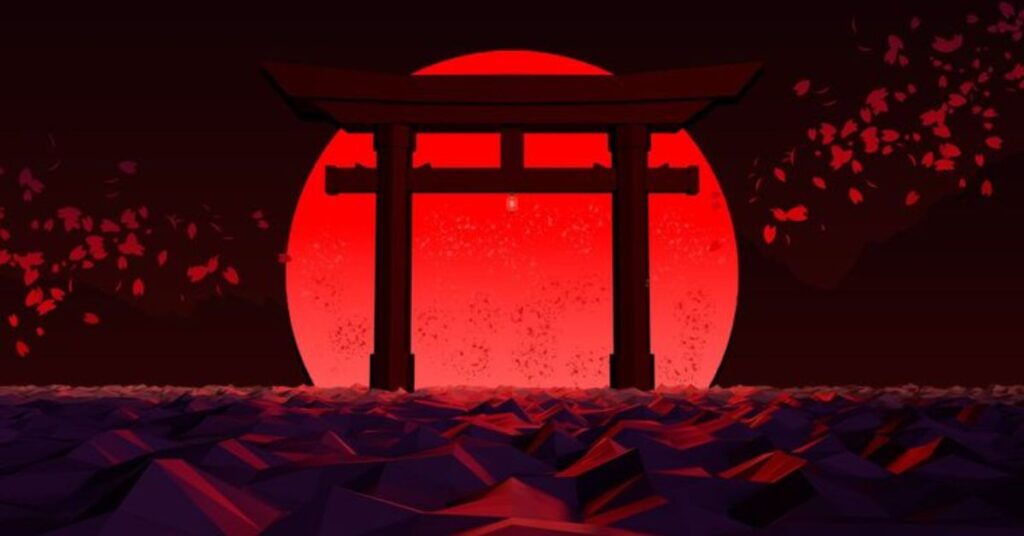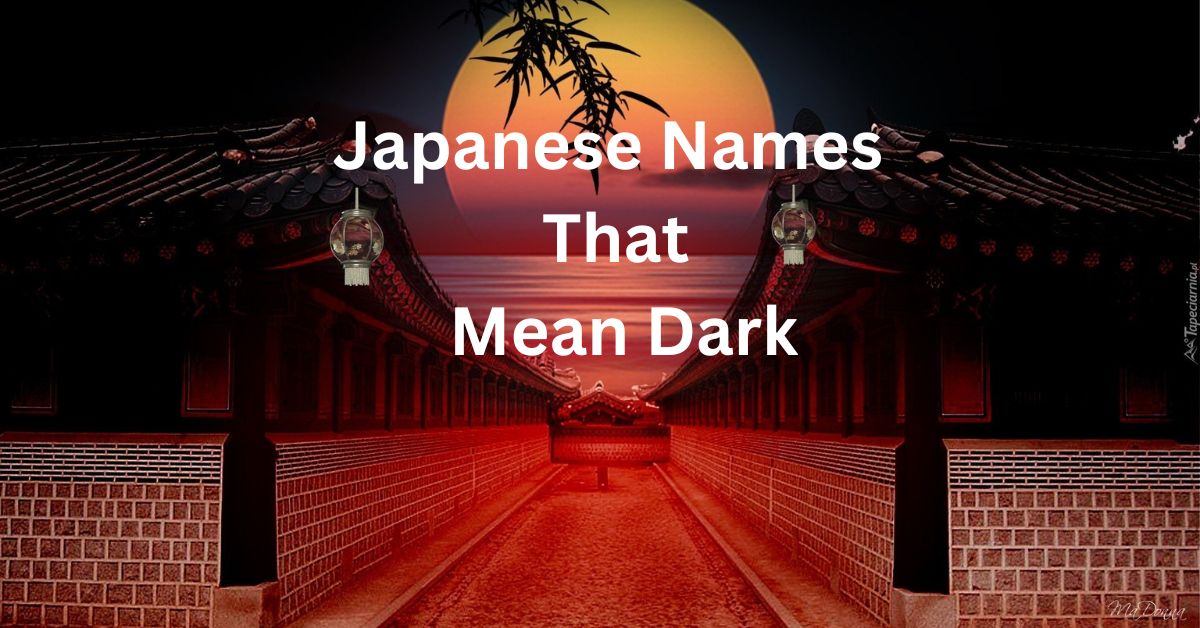Japanese names that mean “dark” often carry deep and mysterious meanings. These names are inspired by nature, emotions, or folklore connected to darkness. They can symbolize elegance, strength, or the unknown.
Dark-themed names are unique and intriguing. They capture the imagination with their mysterious aura. Choosing such a name can reflect individuality and a love for hidden meanings.
In Japan, many names related to darkness come from words for shadow, night, or black. Examples include “Kurai,” meaning dark, and “Yami,” meaning darkness. These names are rare and hold cultural significance.
Significance of Dark Names in Japanese Culture
In Japanese culture, dark names hold deep symbolic meaning. They often represent themes like mystery, strength, or overcoming adversity. Such names are tied to nature, mythology, or spiritual concepts.
For instance, names referencing shadows or the moon symbolize calmness or hidden beauty. They reflect Japan’s appreciation for subtlety and duality.
Dark names also carry a sense of balance in Japanese culture. They remind people of the coexistence of light and dark in life. This idea is deeply rooted in Shinto and Buddhist beliefs. Choosing these names can express resilience, a connection to nature, or respect for life’s unseen aspects.
Japanese Girl Names That Mean Dark
Japanese girl names with dark meanings are elegant and unique. Examples include Yamiko (Kurami (dark beauty). These names reflect a poetic connection to mystery and nature, embodying the quiet beauty of shadows and the depth of the night.
- Akumako (悪魔子): “Child of the devil,” representing darkness tied to malevolence and mysticism.
- Ankoku (暗黒): “Pitch darkness,” symbolizing an absolute absence of light and a foreboding atmosphere.
- Ankokuhana (暗黒花): “Dark flower,” a poetic name blending beauty and obscurity.
- Ankou (暗行): “Dark journey,” implying an exploration into mysterious, shadowy realms.
- Ankohime (暗姫): “Princess of darkness,” suggesting elegance and regality shrouded in mystery.
- Kageha (影羽): “Shadow feather,” evoking delicate movement within darkness.
- Kagehana (影花): “Shadow flower,” symbolizing beauty within obscurity.
- Kagekiri (影切り): “Shadow cut,” a sharp and enigmatic presence.
- Kageko (影子): “Shadow child,” reflecting an elusive and otherworldly nature.
- Kokumajin (黒魔人): “Black sorcerer,” an intense name denoting magical ties to darkness.
- Kokuyami (黒闇): “Black darkness,” emphasizing depth and impenetrability.
- Kokuren (黒蓮): “Black lotus,” a name blending purity and darkness.
- Kuragari (暗かり): “Dimness or obscurity,” highlighting the hidden and mysterious.
- Kurahime (暗姫): “Princess of shadows,” intertwining elegance with a dark aura.
- Kurakaze (暗風): “Dark wind,” representing mystery and movement.
- Kurama (暗魔): “Dark demon,” a powerful and enigmatic name.
- Kurami (暗美): “Dark beauty,” capturing an alluring elegance.
- Kuranagi (暗薙): “Dark scythe,” a sharp, protective name.
- Kurane (暗音): “Dark sound,” symbolizing mystery in the auditory realm.
- Kurana (暗奈): “Graceful shadow,” blending subtlety and charm.
- Kurayami (暗闇): “Darkness,” an evocative name of the unknown.
- Kurohana (黒花): “Black flower,” highlighting beauty in shadow.
- Kurona (暗奈): “Dark harmony,” symbolizing unity within mystery.
- Kurotama (黒魂): “Black soul,” reflecting introspection and depth.
- Kurumi (暗美): “Beautiful darkness,” denoting charm within shadows.
- Murasaki (紫): “Purple,” often associated with darkness and depth.
- Shikabane (屍): “Corpse,” a stark, haunting name embodying the eerie.
- Shinra (深羅): “Deep silk,” symbolizing elegance and shadowy depth.
- Yami (闇): “Darkness,” a direct and evocative representation of obscurity.
- Yamihime (闇姫): “Princess of darkness,” blending grace and enigma.
- Yamikawa (闇川): “Dark river,” depicting shadowy waters.
- Yamikumo (闇雲): “Dark cloud,” embodying mystery in the skies.
- Yamiko (闇子): “Child of darkness,” denoting mystique and allure.
- Yamiyo (闇夜): “Dark night,” capturing the tranquility of nocturnal beauty.
- Yoruhi (夜日): “Night sun,” symbolizing duality and contrast.
- Yoruame (夜雨): “Night rain,” representing calmness amidst the dark.
- Yoruha (夜羽): “Night feather,” a delicate and ethereal name.
- Zetsumei (絶命): “End of life,” a powerful name connoting finality and mystery.
Japanese Boy Names That Mean Dark

Boy names meaning “dark” often represent strength and enigma. Names like Kurai (dark) aAnkoku (darkness) carry a sense of power and depth. These names are rare yet meaningful, perfect for those who want a name that stands out while conveying mystery.
- Akuma (悪魔): Means “devil” or “demon.” Represents a malevolent or dark force in Japanese folklore.
- Akuro (悪路): Translates to “bad path” or “dark road,” symbolizing challenges or troubled journeys.
- Akuryō (悪霊): Refers to “evil spirit,” embodying a sinister or haunting presence.
- Ankoku (暗黒): Means “darkness” or “obscurity,” symbolizing mystery or the unknown.
- Ankokuji (暗黒寺): Combines “darkness” with “temple,” often associated with shadowed sanctuaries in history.
- Ankokuon (暗黒音): Translates to “sound of darkness,” symbolizing eerie or profound tones.
- Ankokuken (暗黒剣): Means “sword of darkness,” a mythical representation of power shrouded in mystery.
- Daku (濁): Means “clouded” or “murky,” signifying something obscured or unclear.
- Daisuke (大輔): Though not inherently dark, it can mean “great helper,” sometimes interpreted as one who supports during dark times.
- Haruki (春樹): A lighter name, meaning “shining tree” or “spring tree,” occasionally linked to renewal after darkness.
- Inen (因縁): Refers to “fate” or “karma,” often associated with inevitable cycles of light and shadow.
- Kage (影): Means “shadow,” symbolizing the inseparable partner of light.
- Kagehoshi (影星): “Shadow star,” signifying a celestial presence hidden in darkness.
- Kanji (寛治): While generally meaning “peace,” in specific contexts, it can represent overcoming inner turmoil.
- Karame (絡め): Means “entangle” or “ensnare,” associated with being trapped in darkness.
- Kokushoku (黒色): Translates to “black color,” symbolizing pure darkness.
- Kurogane (黒金): Means “dark iron,” representing strength forged in shadow.
- Kurohoshi (黒星): “Black star,” a celestial symbol of mystery.
- Kurokawa (黒川): “Black river,” representing a flowing, enigmatic force.
- Kurota (黒田): “Black rice field,” symbolizing fertility and hidden depths.
- Kurozaki (黒崎): “Black cape,” often linked to mysterious landscapes.
- Kuragari (暗がり): Refers to “darkness” or “dimness,” representing obscured vision or uncertainty.
- Kuranaki (暗中): Means “in the dark,” symbolizing situations requiring intuition or hidden truths.
- Kurozato (黒里): “Black village,” often associated with secluded or mysterious places.
- Kurayami (暗闇): Means “complete darkness,” emphasizing depth and obscurity.
- Kurozuka (黒塚): “Black mound,” sometimes linked to folklore and burial sites.
- Kuroyama (黒山): “Black mountain,” a powerful and imposing symbol of shadowed strength.
- Kuroi (黒い): Means “black” or “dark,” embodying the essence of shadow.
- Kurou (九郎): A historical name often linked to the ninth son, resonating with shadows of tradition.
- Kuroro (黒路): “Dark road,” symbolizing a path veiled in mystery.
- Kuruno (黒野): “Black field,” representing fertile, hidden potential.
- Kuruma (車): Means “wheel” or “vehicle,” a metaphor for cycles of darkness and movement.
- Kurashi (暮らし): Refers to “living” or “lifestyle,” connected to life’s darker aspects.
- Makkura (真っ暗): Means “pitch black,” symbolizing impenetrable darkness.
- Makai (魔界): “Demon world,” representing a mythical plane of darkness.
- Mei (冥): Signifies “dim” or “dark,” tied to twilight and subtle mysteries.
- Raiden (雷電): “Thunder and lightning,” often representing storms that pierce darkness.
- Shinigami (死神): “God of death,” symbolizing the ultimate shadow in folklore.
- Shikyo (死教): “Death teaching,” reflecting philosophical or spiritual lessons from darkness.
- Sora (空): While meaning “sky,” it can evoke the vast, dark night sky.
- Takuto (拓人): Suggests “pioneer,” sometimes interpreted as one navigating through dark times.
- Yami (闇): Directly translates to “darkness,” a quintessential representation of shadow.
- Yoru (夜): Means “night,” embodying the tranquility and enigma of darkness.
Japanese Names Meaning Dark Angel

Names that mean “dark angel” combine mysticism with grace. Choices like Kurai Tenshi (dark angel) or Yami no Tenshi (angel of darkness) are imaginative and striking. They evoke a blend of light and shadow, ideal for those seeking a name with symbolic beauty.
- Akuma (悪魔): Represents “devil” or “demon,” symbolizing malevolent power in Japanese folklore.
- Ankoku (暗黒): Means “deep darkness” or “blackness,” emphasizing profound shadowy essence.
- Aoi (葵): Often symbolizes “hollyhock” or “blue/green,” evoking a mysterious nature tied to the night.
- Atsuto (敦翔): Combines “sincerity” and “fly,” implying a balance of groundedness and aspiration, with darker interpretations in specific contexts.
- Hiroki (大樹): Commonly means “large tree,” but its poetic use can symbolize hidden strength and mystery.
- Inei (陰影): Refers to “shadows” or “dim light,” often associated with the beauty of the unseen.
- Kageyuki (影雪): Means “shadow snow,” a poetic depiction of fleeting beauty in darkness.
- Kazuya (一也): Can mean “harmony” or “one and only,” with darker connotations in shadowy or mysterious contexts.
- Kouki (光輝): Typically “radiant light,” but paradoxically used in darker settings as the contrast to shadow.
- Kurogami (黒髪): Literally “black hair,” often tied to beauty and mystery in traditional Japanese stories.
- Kurogane (黒鉄): Means “black steel,” representing resilience and strength in darkness.
- Kuroten (黒天): Translates to “black heavens,” symbolizing celestial mystery and elegance.
- Kuroyu (黒湯): Literally “black water,” suggesting the depth and enigma of shadowy rivers or hot springs.
- Kurotama (黒玉): Means “black gem,” representing hidden beauty or a precious secret.
- Kurashi (暗し): Refers to “darkness” or “gloom,” a poetic term from classical Japanese.
- Kurone (黒音): Means “black sound,” implying eerie or mysterious melodies.
- Kuruten (暗転): Represents “fade to black,” often used in theatrical or poetic contexts.
- Masa (雅): Generally means “elegance,” but in darker narratives, it conveys quiet strength.
- Naoki (直樹): Means “honest tree,” with potential darker nuances in shadowy storytelling.
- Nero (ネロ): Inspired by foreign influences, it conveys a sense of dark authority.
- Raito (雷斗): Meaning “lightning fighter,” evokes the contrast between stormy darkness and fleeting light.
- Ryo (涼): Typically means “cool,” but in poetic contexts, it can hint at the calm of dark place.
- Ryoji (亮司): Combines “clear” and “to rule,” symbolizing hidden clarity within shadows.
- Shirou (四郎): Meaning “fourth son,” but can imply stability in shadowy traditions.
- Sumi (墨): Translates to “ink,” representing darkness in artistic and poetic forms.
- Tomo (友): Means “friend,” but its use in darker settings conveys a protective bond within shadows.
- Tsubasa (翼): Symbolizes “wings,” often linked to freedom or fallen angels in shadowy themes.
- Yukio (幸男): Commonly means “blessed man,” but can carry a darker poetic irony in specific contexts.
- Yoshiki (良輝): Typically “good light,” but may imply hope amidst darkness in narrative uses.
- Yamigami (闇神): Translates to “dark god,” embodying powerful and mysterious deities.
- Yamikage (闇影): Meaning “shadow of darkness,” emphasizing layers of mystery and concealment.
Cool Japanese Names Meaning Dark
Cool names with dark meanings are modern yet rooted in tradition. Names like Kage (shadoRikuto (land person, often linked to shadowy earth) are striking and stylish. They offer a mix of mystery and strength, ideal for anyone seeking a bold, meaningful name.
- Akira (明/闇): A versatile name meaning “bright” or “dark,” depending on the kanji used. It signifies duality and balance.
- Akio (秋男): Meaning “bright man” or “man of autumn,” Akio symbolizes wisdom, often associated with deep, introspective qualities.
- Akuma (悪魔): This name translates to “devil” or “demon,” embodying themes of mystery and danger.
- Ankoku (暗黒): Meaning “darkness” or “blackness,” this name emphasizes profound obscurity and hidden depth.
- Daku (濁): A name meaning “murky” or “gloomy,” symbolizing mystery and emotional complexity.
- Gaku (岳): Typically meaning “peak” or “mountain,” it metaphorically relates to looming darkness or challenges.
- Hikaru (光): Usually meaning “light,” it can denote the faint glimmers of hope in a dark situation, reflecting duality.
- Hiro (弘/寛): A name meaning “broad” or “generous,” Hiro contrasts subtly with themes of isolation in the vastness of darkness.
- Inei (陰影): Translates to “shadow” or “shade,” representing elusive and transient beauty within obscurity.
- Isamu (勇): Meaning “bravery,” this name can represent strength when facing the metaphorical darkness.
- Jiro (次郎): A traditional name meaning “second son,” often associated with grounded, steadfast qualities.
- Kenji (健二): A classic name meaning “strong and healthy,” which may metaphorically allude to resilience in the face of darkness.
- Kuro (黒): Simply meaning “black,” this name embodies elegance, mystery, and the allure of the unknown.
- Kurohime (黒姫): Translating to “black princess,” this name is steeped in gothic beauty and noble mystique.
- Kuroko (黒子): Meaning “black child,” it symbolizes anonymity and unseen support, often linked to traditional Japanese theater.
- Kurono (黒乃): A modern interpretation of “of the black,” blending tradition with contemporary aesthetics.
- Kuronami (黒波): Meaning “black wave,” this name represents the unpredictable power and depth of the sea.
- Kurozuka (黒塚): A mythical name meaning “black mound,” often associated with folklore and supernatural elements.
- Rei (霊): A unisex name meaning “spirit” or “soul,” often linked to ethereal and mystical qualities.
- Shiro (白): Meaning “white,” it contrasts sharply with darkness, emphasizing purity amidst obscurity.
- Shouta (翔太): This name means “soaring” or “big flight,” metaphorically representing rising above darkness.
- Shu (修): A name meaning “discipline” or “refinement,” symbolizing inner strength amidst adversity.
- Tatsu (龍): Meaning “dragon,” Tatsu signifies power and mystery, often connected to shadowy myths.
- Taro (太郎): A traditional name for “eldest son,” grounding the name in reliability and familial strength.
- Yami (闇): Simply meaning “darkness,” this name is a direct and powerful expression of mystery and the unknown.
- Yamiakuma (闇悪魔): Combining “darkness” and “devil,” this name amplifies themes of danger and intrigue.
- Yamiharu (闇春): Meaning “dark spring,” this name juxtaposes renewal and shadow, reflecting complex beauty.
- Yamino (闇野): Translating to “field of darkness,” it invokes an expansive and mysterious landscape.
- Yamitsu (闇罪): Meaning “sinful darkness,” this name is deeply evocative of shadowy intrigue.
- Yuki (雪): While often meaning “snow,” Yuki can signify cold, silent darkness depending on the kanji.
- Yuto (悠翔): This name combines “eternal” and “flight,” symbolizing transcendence over dark times.
- Yoru (夜): Meaning “night,” this name resonates with serenity and the quiet beauty of darkness.
- Yurei (幽霊): A ghostly name meaning “phantom,” connected to supernatural tales and folklore.
ALSO READ : Japanese Names That Mean New Beginning
Unisex Japanese Names Meaning Dark
Unisex names with dark meanings are versatile and meaningful. Names like Yoru (night) and Kage (shadow) are simple yet profound. Their connection to nature and mystery makes them suitable for any gender, offering timeless appeal and inclusivity.
- Akuma (悪魔): A name meaning “demon,” representing darkness and danger, often associated with folklore and myth.
- Ankoku (暗黒): Means “darkness” or “obscurity,” symbolizing deep mystery.
- Anmu (暗夢): Refers to a “dark dream,” evoking depth and the subconscious.
- Anrei (暗霊): Means “dark spirit,” reflecting the ethereal nature of shadows and mystery.
- Hikari (陽暗): Juxtaposes light (陽) and dark (暗), often interpreted as twilight or balance.
- Kage (影): Translates to “shadow,” symbolizing subtlety and the interplay between light and dark.
- Kageboshi (影星): Means “shadow star,” reflecting hidden beauty in the night sky.
- Kageyuki (影雪): Combines “shadow” and “snow,” evoking a quiet, darkened elegance.
- Kokoa (心霊): A mystical name meaning “spirit heart,” often associated with ghostly or dark themes.
- Kokoro (心): While it primarily means “heart,” it can also imply depth and mystery.
- Kurayami (暗闇): Signifies “pitch darkness,” emphasizing deep night or intense obscurity.
- Kuro (黒): Simply means “black,” a direct and strong connection to darkness.
- Kurobane (黒羽): Translates to “black feather,” symbolizing the duality of lightness and shadow.
- Kuroka (黒花): Means “dark flower,” representing beauty within shadow.
- Kurohana (黒花): Another variation meaning “black blossom,” highlighting mystery and growth.
- Kurou (九郎): Though it often means “ninth son,” it resonates phonetically with darkness.
- Kurumi (胡桃): Refers to “walnut,” symbolizing hidden wisdom in dark shells.
- Makkuro (真っ黒): Means “pitch black,” emphasizing the depth of absolute darkness.
- Mayonaka (真夜中): Translates to “midnight,” the heart of the night.
- Mei (冥): Represents “dim” or “dark,” evoking twilight or shadowy elegance.
- Mikazuki (三日月): Means “crescent moon,” symbolizing light’s emergence from darkness.
- Riku (陸): While it typically means “land,” when associated with darkness, it symbolizes mystery.
- Ryohei (涼平): Often connected with tranquility in the dark or cool, calm shadows.
- Shinya (真夜): Meaning “true night,” it emphasizes the core of darkness.
- Sumi (墨): Translates to “ink,” symbolizing creativity and the depth of darkness.
- Tasogare (黄昏): Refers to “twilight,” capturing the transition from light to dark.
- Tsukiko (月子): Means “moon child,” symbolizing light’s guiding presence in the night.
- Yami (闇): Simply means “darkness,” embodying shadow and mystery.
- Yamimaru (闇丸): Signifies a “dark circle,” representing completeness within darkness.
- Yoru (夜): Means “night,” embodying tranquillity and mystery.
- Yuugen (幽玄): Represents “profound mystery,” symbolizing the subtle beauty of shadows.
ALSO READ : Japanese Names That Mean Death
Popular Japanese Names Meaning Dark

Popular names with dark meanings are both traditional and modern. Kuro (black) and Yami (darkness) are well-known and easy to remember. These names are culturally significant, simple, and meaningful, making them attractive choices for parents worldwide.
- Akuma (悪魔): Demon or devil; a name symbolizing malevolence and rebellion. Often used in fictional works for dark characters.
- Akui (悪意): Evil intent; represents malice and a sinister aura.
- Akuryo (悪霊): Evil spirit; associated with hauntings and the supernatural.
- Akumu (悪夢): Nightmare; evokes terror and the realm of unsettling dreams.
- Ankoku (暗黒): Darkness or blackness; symbolizes the absence of light and the unknown.
- Enma (閻魔): The Buddhist god of death, a figure overseeing judgment in the afterlife.
- Kageko (影子): Shadow child; signifies the elusive and ethereal.
- Kuro (黒): Black; represents simplicity and stark darkness.
- Kurobe (黒部): Black bay; tied to geographical and natural darkness.
- Kuroda (黒田): Black rice field; a connection to the earth and mystery.
- Kuroe (黒江): Black inlet; implies a shadowed or mysterious water body.
- Kuroha (黒羽): Black feather; often linked with ravens and foreboding imagery.
- Kurohime (黒姫): Black princess; a regal and dark elegance.
- Kuroi (黒い): Adjective for black; symbolizes depth and simplicity.
- Kurokage (黒影): Black shadow; emphasizes mystery and concealment.
- Kurokawa (黒川): Black river; mysterious and flowing through shadowy landscapes.
- Kuroki (黒木): Black tree; symbolizes resilience in adversity.
- Kurokumo (黒雲): Black cloud; implies an ominous and foreboding presence.
- Kurotsuki (黒月): Black moon; the beauty and mystery of lunar darkness.
- Kuragari (暗かり): Dimness; hints at subtle darkness and obscurity.
- Kurayami (暗闇): Pitch darkness; deep and total obscurity.
- Kurumi (暗美): Beautiful darkness; a name embodying allure hidden in shadows.
- Mayoi (迷い): Bewilderment or lost; signifies a state of confusion or the unknown.
- Rinne (輪廻): Samsara or cycle of life and death; deeply tied to philosophical darkness.
- Shi (死): Death; stark, powerful, and deeply symbolic.
- Shikabane (屍): Corpse; evokes a strong sense of mortality and the macabre.
- Yamiko (闇子): Child of darkness; mysterious and otherworldly.
- Yamiyo (闇夜): Dark night; tranquil and ominous nocturnal imagery.
FAQs
What is a dark name in Japanese?
A dark name in Japanese often includes kanji like 闇 (yami, meaning “darkness”) or 影 (kage, meaning “shadow”).
What Japanese name means dark spirit?
The name “Ankoku” (暗黒) can mean “dark spirit,” symbolizing deep darkness.
What Japanese name means shadow?
The name “Kage” (影) directly translates to “shadow” in Japanese.
What name means darkness?
“Yami” (闇) is a Japanese name that means “darkness” or “the dark.”
What is a Japanese name for nightmare?
The name “Akumu” (悪夢) means “nightmare” in Japanese.
What is the dark god Japanese name?
“Daikokuten” (大黒天), though not evil, is a Japanese god associated with darkness and mystery in folklore.
Conclusion
Japanese Names That Mean Dark carry deep meanings and unique symbolism. They often reflect ideas of shadows, mystery, and the unknown. Names like Yami, Kage, and Ankoku represent darkness in different ways. These names connect to Japanese culture and its appreciation for both light and dark.
Choosing a name with a dark meaning can feel meaningful. It shows strength, mystery, or elegance. Japanese Names That Mean Dark are perfect for people who love deep, symbolic names with cultural value.

Helen Lisa is the admin of our platform dedicated to exploring the meanings and origins of names. With a deep interest in linguistics and culture, she curates insightful content to help users uncover the stories behind names. Helen’s expertise ensures a valuable and engaging experience for our audience.











